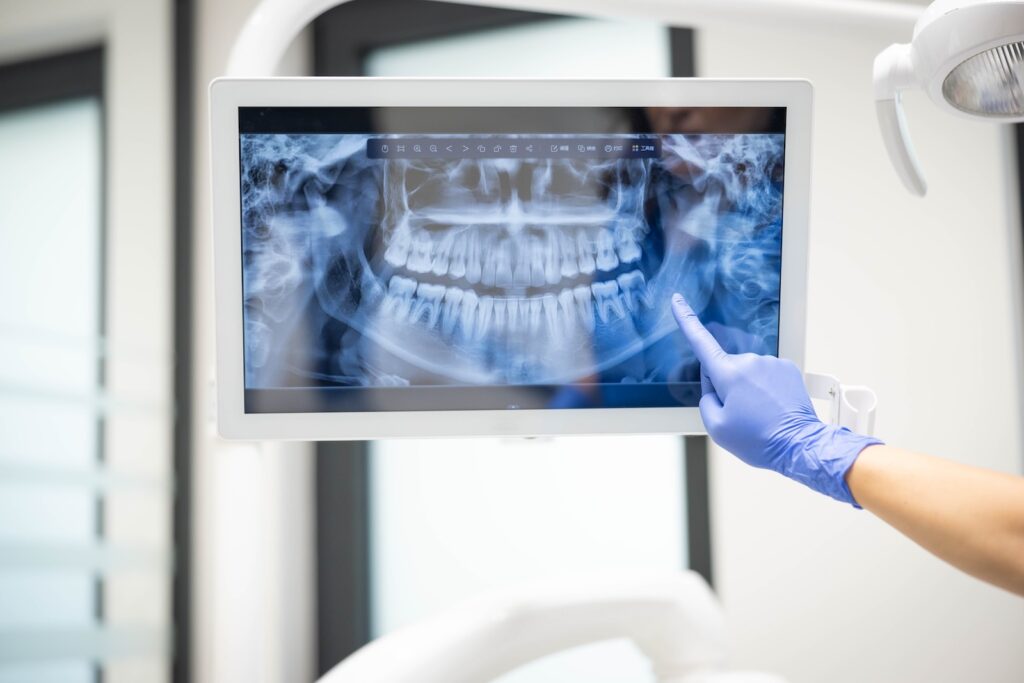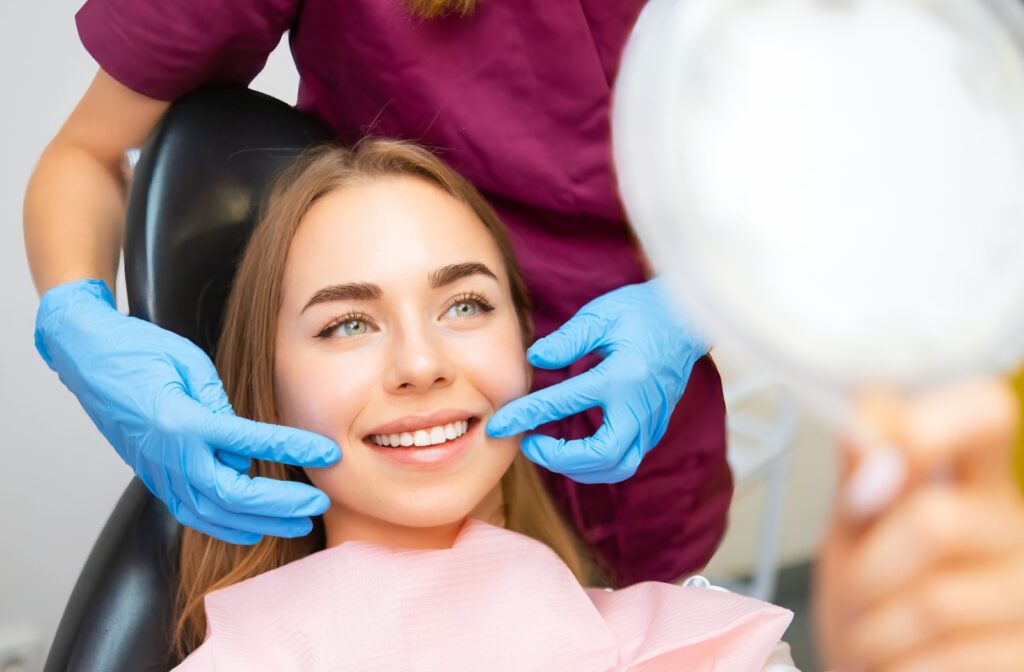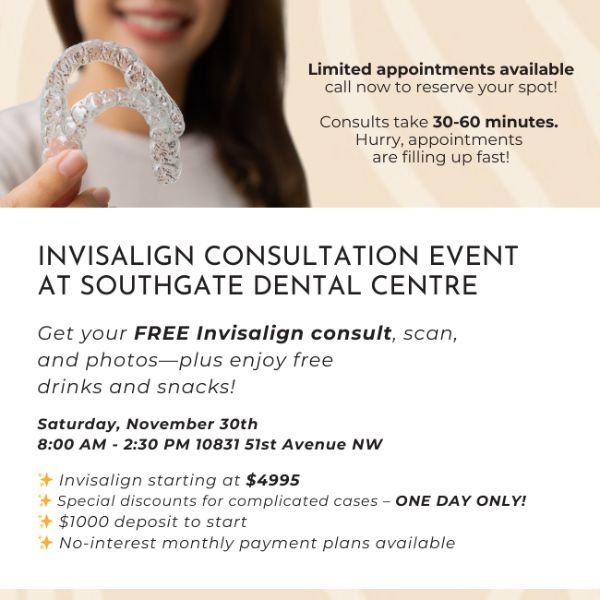You may have heard your dentist mention a “recall exam” and wondered what that means. A dental recall exam is another name for your regular dental check-up. It’s a routine appointment designed to help you maintain your oral health and catch any potential issues early on.
If you visit your dentist for regular cleanings, you have likely already had several recall exams without even realizing it. Your comfort and satisfaction matter, so we use these visits to make sure your experience is pleasant while keeping your smile healthy.
These appointments are a key part of preventive care.
The Difference Between a Recall Exam & Other Dental Visits
Not all dental appointments are the same. Your visit with a dentist will fall into one of a few categories based on your needs at the time.
Recall Dental Exams
A recall exam is a routine check-up that happens usually during your regular cleaning appointments. Recall exams help monitor your oral health for change, so that your dentist can identify problems early and prevent them from developing.
Comprehensive Dental Exams
A comprehensive or a complete exam is a much more detailed evaluation of your entire oral health. This usually happens on your first visit to a new dental office. It can also happen if it has been a few years since your last thorough assessment.
At Southgate Dental Centre, we typically perform a complete exam every 5 years to help ensure we don’t miss anything when it comes to your oral health.
Specific & Emergency Exams
These exams usually focus on one specific problem area you’re experiencing. If you have a toothache or another urgent concern, this type of targeted exam can help diagnose the issue quickly. This allows your team to address your chief complaint and find a solution.
What Happens During Your Recall Appointment?
A recall appointment is a straightforward process designed to be thorough and efficient. Knowing what to expect can help you feel relaxed and prepared for your visit.
A Review of Your Health History
Your dentist or hygienist will talk with you about any changes to your overall health or medications. Conditions like diabetes or heart disease can also affect your oral health, so keeping your dental team informed helps them provide appropriate care. Medications you are on can affect your oral health and treatment decisions.
A Professional Teeth Cleaning
During your appointment, a dental hygienist provides services such as scaling to remove plaque and tartar—the hard buildup that your toothbrush can’t remove at home. This helps prevent cavities and gum disease.
Typically they also provide fluoride treatment and oral hygiene instruction.
A Complete Oral Examination
After your cleaning, your dentist will check your teeth, gums, and mouth. They’ll also look at the condition of existing dental work like fillings or crowns. This helps them see if your previous treatments are still in good shape.
A Screen for Oral Health Issues
A key part of a recall exam is to look for early signs of potential issues. Your dentist and hygienist will check for things such as:
- Tooth decay & cavities
- Gum disease
- Oral cancer
- Bone loss
X-Rays When Needed
X-rays give your dentist a view of what’s happening below the surface of your gums. This can reveal cavities between teeth, bone health, and the position of your tooth roots. Check-up x-rays, like bitewing x-rays, are typically recommended every 6 months to 2 years.
Exceptions to this are if you’ve been in the hospital or sick you should get check-up x-rays. Also, if you have implants or recent major dental work like crowns, bridges, or root canals, you should also have check-up x-rays every 6 months.
Time for Your Questions
Your recall exam is the perfect time to ask any questions you have about oral health. Also it is a good time to ask about your cosmetic concerns with your smile. Whether you have concerns about tooth sensitivity or want advice on your home care routine, we’re here to help. We want you to feel confident in your oral health.

Why Regular Recall Exams Are Important
These routine check-ups are a key part of preventive dental care. They offer several important benefits for both your oral and overall health.
Spot Problems Early
Identifying issues like cavities, gum disease, and oral diseases such as cancer in their early stages makes them much easier to manage. This can lead to more comfortable and straightforward treatments.
Avoid More Complex Treatments
By managing small problems right away, you can prevent the need for more involved procedures down the road. Preventive care helps keep your smile healthy with minimal intervention. It’s about maintaining what you have, not just fixing problems.
Support Your Overall Health
As research shows, your oral health is connected to your general well-being. A healthy mouth can help reduce the risk of other health conditions, such as heart and kidney disease. This means that dental care is an important part of a healthy lifestyle.
How Often You Need a Dental Recall Exam
The recommended frequency of recall exams depends on your oral health needs. While every six months is a common recommendation, your dentist will suggest a schedule for you based on your dental history and current condition.
- Children & Teens: Usually benefit from exams twice a year to monitor for cavities and guide their developing smiles.
- Adults: A check-up every six months to one year is a standard schedule for maintaining good oral health and preventing common issues.
- Older Adults & Others: Those with a history of gum disease or other health conditions may need more frequent visits to stay on track.
Prepare for Your Exam & Care for Your Smile
A little preparation can help you make the most of your appointment. Taking a few simple steps beforehand ensures all your concerns are addressed, and your daily habits support the work we do in the office.
Make a List of Questions & Concerns
Think about your oral health before your visit. Note—or write down—any pain, sensitivity, or other changes you’ve noticed. This helps you remember to discuss them with your dentist.
Share Your Medical History
Be ready to talk about any new medications you’re taking or recent changes in your health. This information helps your dental team provide safe and effective care.
Your Role Between Visits
While your dentist in South Edmonton is a partner in your health, your daily habits make a big difference. Good home care is the foundation of a healthy smile. Make sure to:
- Brush your teeth at least two times a day with a fluoride toothpaste.
- Floss every day to clean between your teeth where a toothbrush can’t reach.
- Limit sugary foods and drinks that contribute to tooth decay.
Is It Time for Your Next Appointment?
Routine dental recall exams are a simple yet effective way to protect your smile for years to come. They provide an opportunity to check in on your health, ask questions, and get a professional cleaning.
At Southgate Dental Centre, we’re here to support you on your oral health journey. Please feel free to request an appointment online to schedule your next visit.



